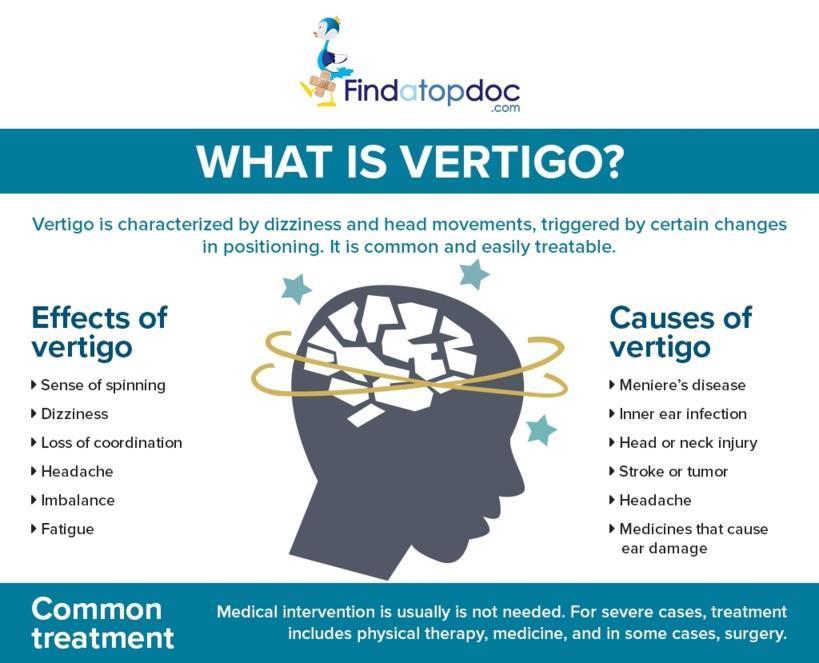
Vertigo is the feeling that you or your environment is moving or spinning. It differs from dizziness in that vertigo describes an illusion of movement. When you feel as if you yourself are moving, it's called subjective vertigo, and the perception that your surroundings are moving is called objective vertigo. Unlike nonspecific lightheadedness or dizziness, vertigo has relatively few causes.
What Causes Vertigo?
Vertigo can be caused by problems in the brain or central nervous system (central vertigo) or the inner ear (peripheral vertigo). Vertigo is a symptom of other conditions and is not in itself contagious.
Benign paroxysmal positional vertigo (BPPV) is the most common form of vertigo and is characterized by the brief sensation of motion lasting 15 seconds to a few minutes. This may be described as a sudden attack of vertigo. It may be initiated by sudden head movements or moving the head in a certain direction, such as rolling over in bed. This type of vertigo is rarely serious and can be treated. Vertigo may also be caused by inflammation within the inner ear (labyrinthitis or vestibular neuritis), which is characterized by the sudden onset of vertigo and may be associated with hearing loss. The most common cause of labyrinthitis is a viral or bacterial inner ear infection. The duration of symptoms can last for days until the inflammation subsides. Viruses that may cause labyrinthitis or vestibular neuritis include herpes viruses, influenza, measles, rubella, mumps, polio, hepatitis, and Epstein-Barr virus (EBV). Anxiety or panic attacks may also cause people to feel the sensation of vertigo. Stress may worsen symptoms, though it usually does not cause them.
What are the Symptoms of Vertigo?
Vertigo implies there is a sensation of motion either of the person or the environment, often perceived as if the room is spinning around you. This should not be confused with symptoms of lightheadedness or fainting. Vertigo differs from motion sickness in that motion sickness is a feeling of being off-balance and lacking equilibrium, caused by repeated motions such as riding in a car or boat.
Treatment for Vertigo
There are a variety of treatments for vertigo including self-care remedies, medications, and physical therapy maneuvers. Home therapy should only be undertaken if you have already been diagnosed with vertigo and are under the supervision of a doctor. If your doctor approves, there are some natural home remedies that may help relieve the symptoms of your vertigo. Scientific evidence supporting some remedies is often lacking. There have been some claims that essential oils, including peppermint, ginger, lavender, and frankincense, may help relieve symptoms of vertigo. Read all instructions for use and consult your doctor before trying these natural remedies, as some can have side effects, especially if you have respiratory illness.
Any signs and symptoms of vertigo should be evaluated by a doctor. The majority of cases of vertigo are harmless. Although vertigo can be debilitating, most causes are easily treated with prescription medication. Have a doctor check any new signs and symptoms of vertigo to rule out rare, potentially serious, or life-threatening causes. The source of vertigo may be not the ears or balance system (vestibular system) and it is very important to rule out other life-threatening causes first.